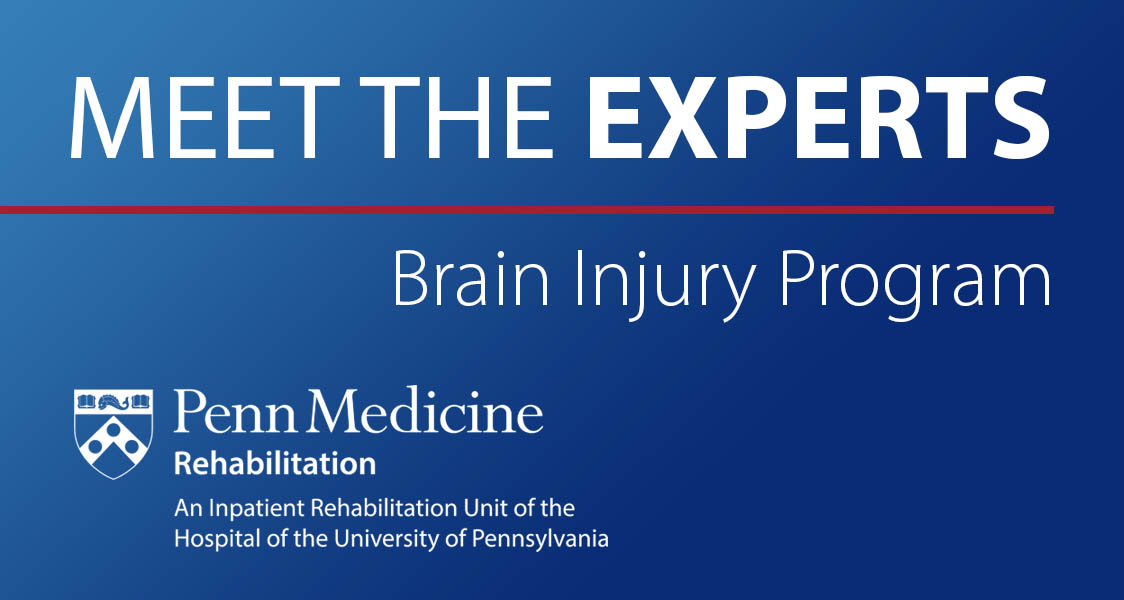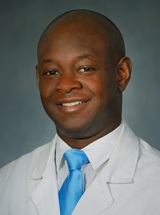Brain Injury Rehabilitation Program Director
Penn Medicine Rehabilitation
An inpatient rehabilitation unit of the Hospital of the University of Pennsylvania
“Working with someone to achieve their full potential is a priceless experience.”
Jeremy Yves Charles, MD
After experiencing a brain injury, it can be difficult to find the right resources to help you or a loved one recover. As Director of the Brain Injury Program at Penn Medicine Rehabilitation, Jeremy Yves Charles, MD, oversees the Brain Injury Recovery Center, a program dedicated to the holistic recovery of brain injury patients. From their Rittenhouse location in Philadelphia, he and a team of therapists, rehabilitation nurses and neuropsychologists help hundreds of patients learn the skills they need to lead productive, fulfilling lives.
Here we learn more about Dr. Charles’ background and why his work is so important to him.
Q. Can you tell us a little about your role?
A. My primary role is to connect patients with the care and resources they need. I spend a lot of time with new patients and their families so I can understand their needs and how to best support them. Those observations allow me and the treatment team to coordinate the best plan of care for each patient and family.
Q. What is a brain injury?
A. There are two primary types of brain injury – traumatic and non-traumatic. Traumatic injuries occur as the result of an external force like car accidents, falls and sports injuries, while non-traumatic injuries occur as a result of internal conditions such as strokes, vascular malformations (such as aneurysms) and brain tumors
Q. How does brain injury impact patients?
A. Both traumatic and non-traumatic brain injury can cause debilitation. Sometimes patients have milder symptoms and improve their function quickly. Sometimes patients have severe symptoms and have longer-term issues with cognition, motor and/or sensory deficits and personality changes.
Q. What motivates you?
A. It is really a privilege to do the job I do. Inpatient rehabilitation can truly make miracles happen. Every day, I get to witness patients get better. Seeing a patient achieve their potential – something as simple as speaking their first words – makes me grateful for the opportunity to play a role in their recovery.
Q. What role can families and caregivers play in recovery?
A. The patient’s caregiver is truly one of the most important parts of the team. We work very hard to educate them about what to expect and how they can support the patient. The more they understand, the better the outcome. Caring for someone with a brain injury is definitely an adjustment, so we want to make sure we do everything possible to support that person.
Q. What advice would you offer someone who’s experienced a brain injury?
A. Be patient with yourself and the recovery process. The brain is a complex and amazing organ that can and does recover. Don’t be afraid to ask for help – it’s why we’re here.
Q. What is on the horizon in treating brain injuries?
A. Technology (via new imaging techniques) is helping us better identify the specific pathways involved in brain injuries. As we learn more, we can further target our approaches to optimize outcomes. Technology (i.e. non-invasive brain stimulation) is also key to new therapeutic opportunities. We work closely with the University of Pennsylvania research teams to evaluate the potential of new treatments to help our brain-injured patients.
Jeremy Yves Charles, MD
- Undergraduate: Cornell University
- Medical School: SUNY Downstate College of Medicine
- PM&R Residency: Penn Medicine
- Neurorehabilitation Fellowship: Brain Injury Medicine: Hackensack Meridian Health JFK Johnson Rehabilitation Institute
- Professional Memberships: Association of Academic Physiatrists, the American Academy of Physical Medicine and Rehabilitation and the American Board of Physical Medicine and Rehabilitation
To learn more about the Brain Injury Program at Penn Medicine Rehabilitation, visit our web page.


